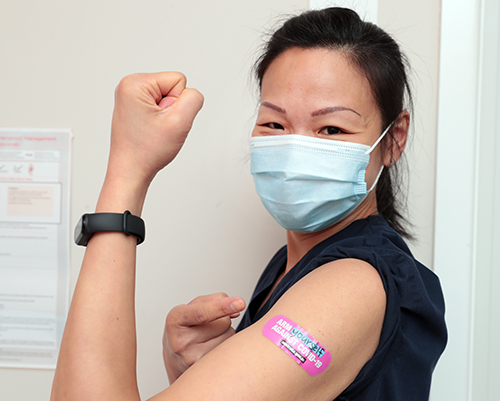LOCAL vaccine champion Kim Ching, a qualified pharmacist and pharmacist immuniser, is back to tackle some of the common questions raised by the community about COVID-19 vaccination.
Today she talks about the latest recommendations made in regards to the vaccination of children, as families across the region prepare for a return to school next week.
Kim says the availability of the COVID-19 vaccine to children aged five to 11 from January 10 was welcome news to many parents.
However, she says it is also understandable that some parents have questions about the vaccines, especially around vaccine safety.
“Considering the benefits and risks of vaccination in children is a delicate balance for many parents,” she says.
“They need to have the opportunity to have these addressed and to access clear, trustworthy information to guide their decision- making.”
What is the vaccine (and the vaccination schedule)?
Children aged five to 11 will receive a new formulation of the paediatric Pfizer vaccine created and explicitly registered for their age group.
ATAGI recommends that children aged five to 11 receive two doses of the paediatric Pfizer vaccine, eight weeks apart.
The paediatric Pfizer vaccine is a lower dose vaccine containing one-third (10ug instead of 30ug) of the recommended dose for people 12 years of age and older.
The interval can be shortened in special circumstances to a minimum of three weeks, such as in outbreak response, prior to the initiation of significant immunosuppression or international travel.
Protection against COVID-19 starts about two to three weeks after the first dose.
While one dose may provide some protection, it may only last for the short term, while two doses will give improved protection.
Why are we vaccinating children aged five to 11?
The vaccine will directly protect the children from getting sick from COVID-19, especially severe infection, and potentially for any longer-term side effects or long- COVID.
Even though most children experience no symptoms or mild symptoms, one per cent of symptomatic children who test positive for COVID require hospitalisation.
Furthermore, about one in 3200 children may experience the rare but severe multisystem inflammatory syndrome in children (MIS- C).
In the United States, almost 6000 MIS-C cases have been re- ported.
Most children with MIS-C need to be treated in hospital, and a small proportion of children with MIS-C have died.
Most people who contracted MIS-C were aged between five and 11 years.
A recent clinical trial published in January 2022 showed the estimated effectiveness of two doses of Pfizer COVID-19 vaccine against MIS-C was 91 per cent.
Among critically ill MIS-C patients requiring life support, all were unvaccinated.
Children with pre-existing medical conditions are at greater risk and need to be prioritised.
The vaccine is also essential in reducing the spread of COVID-19 and helping to keep schools open so that children can have more face-to-face learning and play-time with their friends.
The COVID-19 research brief
published by Murdoch Children’s Research Institute (MCRI) last week has outlined the pandemic’s significant toll on children’s mental well-being, academic results, and physical health.
The indirect impacts of the COVID-19 pandemic on children and adolescents are as substantial, if not more so than the direct effects of COVID-19 infection.
What do recent trials and safety data show?
The Pfizer Paediatric Vaccine trial included 2268 children aged five to 11.
Of these children, 1517 were given two doses of vaccine three weeks apart, and 751 were given a placebo.
The results found the vaccine was safe and had good efficacy.
The vaccine was around 90 percent effective at preventing confirmed COVID-19 infection, with three COVID cases in the vaccine group and 16 in the placebo group.
Based on this data, the TGA provisionally approved the vac- cine for use in five to 11 year old Australians.
As of December 9, 2021, more than 5 million US children in this age group have received at least one dose, and more than 2 million have received both doses of the Pfizer COVID-19 vaccine.
The large, real-world population has identified no specific safety concerns in this age group, noted that the number of children vaccinated is almost double Australia’s entire primary school-aged population.
One potential concern authorities are watching out for is the risk of heart inflammation, called myocarditis.
This is a rare side effect after the second dose in young males aged 12-17, with an estimated risk of around 10 cases per 100,000.
The clinical trial in children aged five to 11 years did not have enough participants to assess rates of myocarditis or pericarditis following vaccination with the Pfizer COVID-19 vaccine.
Still, no specific safety concerns have been identified so far from millions of doses of this vaccine administered overseas to children aged five to 11 years.
What makes Omicron different from other variants?
With Omicron becoming the dominant variant, it is much more transmissible and is causing new waves of infections, including children.
However, most experts, including many in Australia, believe Omicron is no more dangerous to children than previous strains.
Because of the sheer high numbers of children getting infected, more children are in hospital, but they are still a tiny proportion of overall cases.
Should the vaccine be mandated for children?
While vaccination is recommended for children aged five to 11 years, ATAGI does not support restricting the activities of children in this age group who are not vaccinated or have only received one dose.
A no-jab policy can compound disadvantages and undermine community trust and confidence.
Many kids have paid a high price during the pandemic.
Children should not be penalised further by restricting access to school, social or sporting activities based on their vaccination status.
Efforts need to be made to sup- port the right of children and their guardians to make an informed decision about vaccination.


